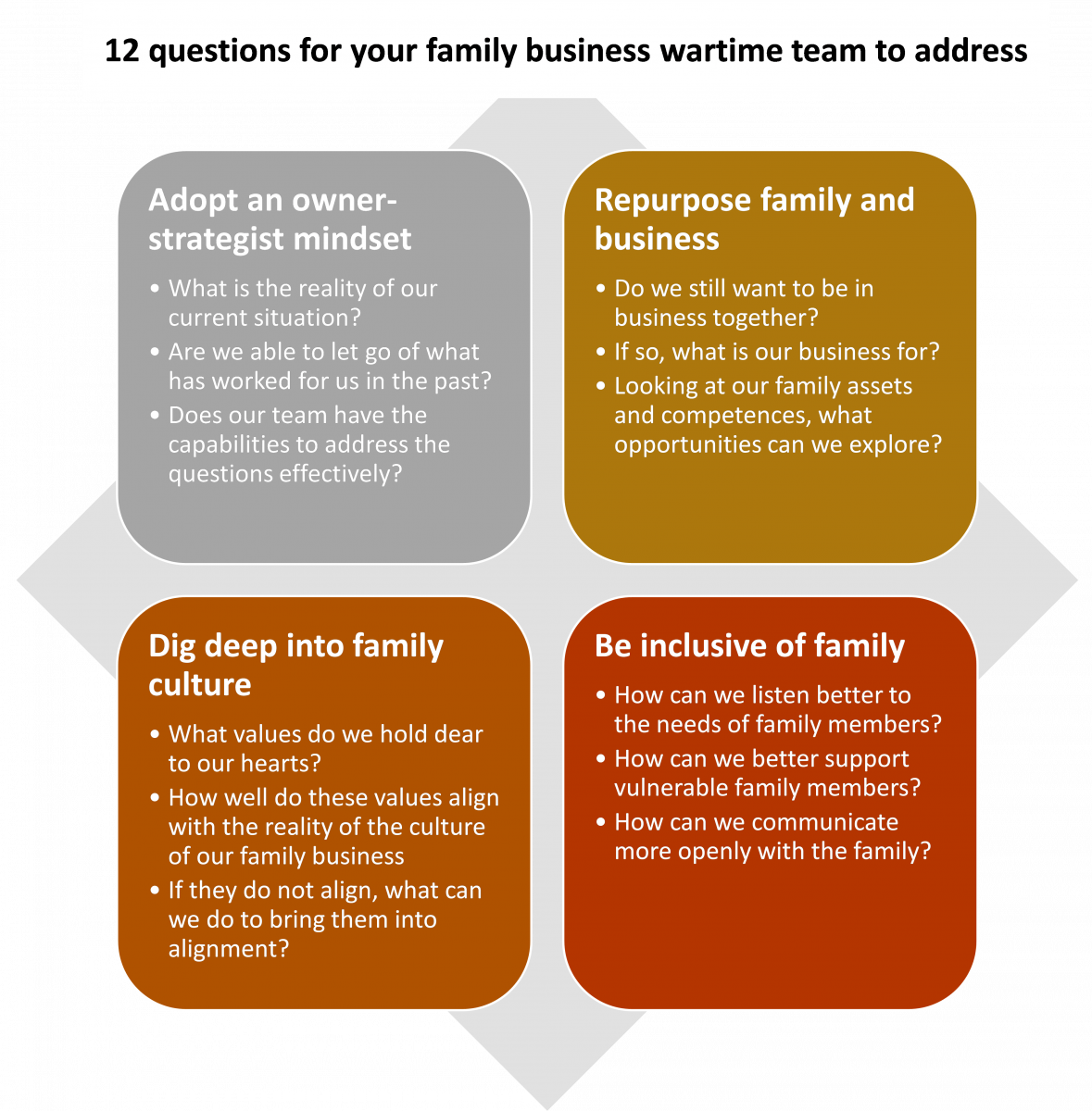Does your family business need a war room?

When in The Godfather—cinema’s most brilliant depiction of a business family—the Corleone family come under attack, they ‘go to the mattresses’, ordering their foot soldiers to move into secret apartments, where they will sleep side-by-side on mattresses and await further instruction.
‘Going to the mattresses’ is far more than a relocation scheme: the phrase is family code for shifting to a wartime footing—one where everything is done differently. The family organise themselves differently; they bring in new people whose skills are more suitable to the challenges at hand; they are highly attuned to the needs of the ‘civilian’ members of their family who have been rendered vulnerable as a result of the crisis; and, as a leadership group, they huddle frequently to share intelligence, explore their options, assess the risks and make decisions.
Everything is in play
What is most striking about the portrait of this family at war, however, is their mindset. Attacked from all sides, their business haemorrhaging, and no end in sight to the hostilities, they never look upon their brief as crisis management. No: what they see is that the disruption to business-as-usual has caused everything to be in play—and that if they are prepared to hold their nerve, think differently, act boldly and take their people with them, they will emerge stronger and harder-to-beat than they ever were before.
In our combined 70 years’ experience as advisers and confidantes of family businesses, we have come across a number of exceptional examples of families who have been struck by terrible external shocks to their business—whether at the hands of rivals, government or broader economic forces—only to reinvent themselves, and in the process become more successful, more resilient and closer as a family. Of course, they take the sensible short-term measures to keep the business afloat—cutting costs, managing the balance sheet, motivating staff as best as the can. But these families do more than just hunker down and offer hopes and prayers.
While it is not our recommendation that business families should emulate Corleone methods in general, we do believe that there is value in the current crisis for business families to adopt the idea of, let us call it, a ‘family business war room’. In a time of lockdown and social distancing, the family business war room is not a physical space: think of it rather as a way of thinking, operating and behaving.
Inside the war room is the wartime team. There is no one-size-fits-all to determine who or how many should serve on the team, but it is probably best to keep numbers tight. The most successful teams tend to be large enough for roles and responsibilities to be spread where no one person is over-burdened, but small enough to be able to build trust quickly, and work collaboratively towards action and decisions. This typically will mean around five to eight people on the team.
The more diverse the wartime team, the more likely it is to be successful. The team should reflect a broad range of talents, bringing together family members who each offer different perspectives, ideas, experiences and specialist knowledge. New problems require new approaches, so you will need everyone on the team to be open-minded to those who think a little differently from themselves. All the research on teams supports the proposition that the more diverse your team, the more likely you are to find successful creative solutions.
Diversity in family business terms works on many other layers: it might mean mixing family members who work in the business and those outside of it; incorporating the female family members, as well as the men; and drawing from different generations among the family—as a baby-boomer and a Gen Z will each look at the same set of business facts with entirely different eyes. For families that organise themselves along branch lines, it might also mean someone from each branch to ensure that each part of the family feels they have a voice and that their interests are represented.
Individual commitment and willingness to step up is vital; there is no room on a wartime team for bystanders or hangers-on: it is a moment to ‘Ask what you can do for your family business, not what the family business can do for you’. Two roles in particular need filling: team facilitator and team coordinator. The facilitator’s job is to run team meetings, enable all voices are heard, ensure the team has goals and works towards them. The coordinator’s role is more managerial, but no less important: this is the person who organises meetings, take notes and ensures people follow up on actions. These roles can be assigned to specific people or can be rotated among the various team members.
 Meet often, work quickly
Meet often, work quickly
There is nothing like a crisis to focus the mind and galvanise people into action. For family businesses, the crisis potentially threatens on three fronts: continuity of the business, assault on the family’s wealth and the physical and mental wellbeing of individual family members.
A wartime team must be attuned to opportunity. It recognises that the sense of fear induced by any of these crises, never mind all three, can act as a powerful motivational force for the family to come together, put aside any differences they may have and work towards a unity of purpose.
How best to capitalise on this shared motivation? Create momentum by accelerating the pace of discussion and decision. Convene the team regularly to enable you all to stay on top of a fast-moving situation. Gather intelligence, evaluate the facts on the ground, create and explore options, consult widely, make decisions: done at pace, all these things will help create a rhythm of activity that will in turn contribute to a sense of self-confidence and positive energy among the team. Momentum can work its own magic: decisions that in normal circumstances would take months—if not years—to plan, agree and implement can often be progressed in a matter of weeks where the will is there.
Once you have the right people in the war room, what next? It will be different, of course, for each family, but we believe that the following four guidelines can be applied universally, in order to optimise your team’s efforts and gain positive outcomes.
1. Adopt an owner-strategist mindset
Family business owners, depending on the stage on their business and their own preferences, tend to conform to one of three types: owner-operators, owner-strategists or owner-investors. Owner-operators are most comfortable ‘in the engine room’, as they tend to involve themselves intimately in the day-to-day running of the business. Owner-strategists are ‘at the bridge’: they operate typically at boardroom level, with their time and energy focused more on strategic decision-making. Finally, there are owner-investors, who have no personal involvement in running the company, choosing instead to rely on non-family management; owner-investors are ‘on the pool deck’.
Given the nature of the Covid crisis, we would advise the family wartime team to adopt an owner-strategist mindset, irrespective of what they actually are in reality: it is simply too risky to behave otherwise. An owner-operator mindset is suited to business-as-usual, but can be highly limiting during periods of change and turbulence. Owner-operators risk getting caught up in the weeds, unable to see the bigger picture and perhaps unwilling to contemplate radical change. An owner-investor mindset at this time carries opposite risks inherent in abdicating the fate of the family’s wealth and business prospects entirely to other people: how responsible is it to place total trust in managers who have never faced a situation like this before?
Let us consider what good owner-strategists do and how adopting their mindset can best serve both the family and the business.
The best owner-strategists are not afraid to encounter the truth; rather, they embrace it. As management expert Jim Collins writes in Good to Great, ‘You must have the discipline to confront the most brutal facts of your current reality, whatever they might be,’ while at the same time ‘maintain unwavering faith that you can and will prevail in the end, regardless of the difficulties.’ The war team needs to face the facts together, from the get-go—and because this is a family business, the ‘facts’ go beyond the business; they also include anything pertinent about family dynamics and family finances. The earlier everyone on the team knows how the land lies, the more likely it is that they will bond quickly, develop a high level of mutual trust and be willing to support each other through thick and thin.
 The owner-strategist mindset is also bifocal. Owner-strategists simultaneously focus on the near term and the longer term—fighting forest fires, and at the same time figuring out what and where to plant for the next generation and beyond. They engage in parallel planning, having learned to immerse themselves in problems of the present while building foundations for better futures.
The owner-strategist mindset is also bifocal. Owner-strategists simultaneously focus on the near term and the longer term—fighting forest fires, and at the same time figuring out what and where to plant for the next generation and beyond. They engage in parallel planning, having learned to immerse themselves in problems of the present while building foundations for better futures.
Good owner-strategists are not reflexively defensive or offensive, nor are they hampered by sacred cows—ideas that are so highly regards they are considered beyond challenge and re-evaluation. They maintain a studied balance between dedication and objectivity in their approach. They honour the past, but do not blindly cling on to it. They are careful to distinguish between the family’s legacy on the one hand and the need to adapt themselves to new circumstances, new realities and new opportunities. In their stewardship of the family business, they recognise that each succeeding generation builds on the structures and reputation it inherits, but ultimately must define its own way and set its own course.
For families that do not normally operate on an owner-strategist basis, check that your wartime team can rise to the challenge and is capable of adopting this mindset. Not everyone can, and there is no shame in admitting to this. An owner-strategist mindset is a precursor to success, so you may need to bring people onboard for whom this is more natural operating territory.
 2. Repurpose the family and the business
2. Repurpose the family and the business
Perhaps the greatest superpower possessed by successful family businesses is their ability to focus on the long-term horizon, making decisions today that will come to fruition over decades. These businesses have a profound sense of their own purpose: they know why they want to be in business together and what they want the business to achieve.
Much of this planning is traditionally based on past experience—what has worked in the past—and an assumption that future change is incremental. In today’s world, however, which is characterised more by turbulence, unpredictability and impending threat, as well as by previously unimagined opportunity, family businesses must learn to think, adapt and act differently. Into their long-termist mix, they must now develop agility and hone their capacity to deal with an accelerated pace of change.
The challenge for the wartime team is to harness abundance thinking in order to re-purpose. It starts with a recognition that when a family business is under severe stress, there are economic dangers for the business, but there are also emotional and psychological dangers for the family. Many family businesses have high levels of interdependence between family and business: if all efforts to repurpose are focused on only one of these, say the business, then the family is likely to suffer—and when the family suffers or starts to break down, the damage inevitably spills over into the business.
So the family needs to revisit the basic premises, by asking: do we still want to be in business together? If we do, what is our business for? Is it there primarily to fund our lifestyle as a family or does it serve some other purpose? If its sole function is financial, is this the best way to invest family capital or could we do something better with the money?

These are tough conversations to have. They require people to leave their ego outside the room and avoid playing the blame-game for past decisions that only now look naive or foolish with the benefit of hindsight. For a business that made a big bet on a single market or industry, the repurposed mission might entail a long-term pledge to diversify into more recession-proof markets. For businesses that were seduced by the drive for ever more ambitious enlargement, repurposing might mean closing down an unviable business for the sake of saving another.
Repurposing the business goes well beyond survival. Understandably, most family businesses have been focused on survival since the crisis began. This has been essential to get the business through the hardships of ‘today’, but it will not help build the business of tomorrow. For this, the wartime team will need to focus on opportunity. Stephen Covey calls this ‘abundance thinking’ in his seminal book, The 7 Habits of Highly Effective People: abundance thinking, he says, is ‘a concept in which a person believes there are enough resources and successes to share with others’—in contrast with scarcity thinking, which is founded on the idea that you lose if someone else is successful.
Abundance thinking can guide the team in looking at the family’s competences and assets and adapting these to emergent and possible future opportunities. What opportunities exist, for example, to take on adjacent businesses? How can digitisation transform the business? To what extent does the crisis present opportunities to shorten supply chains and partner more with local producers?
No less challenging are the family conversations on the subject of repurposing. For some, this will mean reinventing a new model for family members who have historically lived off a salary or dividend from the business: what can they do now and how can the family support them? For others, the question of what the business really means to them will be all too real as they are asked to reinvest their family shareholder wealth back into the business to help nurse it back into health—will the family all want to do this or will some elect to let the business go? For others still, who can see a way out of the current malaise, there may be a sense of renewed purpose around creating a ‘never again’ pot—a mission to build a family war chest outside the business which will serve the family in times of need and ensure that never again will they expose themselves to financial vulnerability.
 3. Dig deep into family culture
3. Dig deep into family culture
Doesn’t it seem counter-intuitive to be spending time discussing family values and culture when the business faces an existential threat? Perhaps, but this is the one of the early conversations your team must have in the war room.
The reason is that during this period and beyond, the family is going to be tested with all sorts of difficult decisions, risky propositions, and uncomfortable trade-offs: whether the family should enter an attractive new market in which it has no prior experience; how to balance the need to cost cut with the firm’s duty of care to its staff and customers; if family wealth should be ring-fenced or deployed to reinvigorate the business; and whether to step up philanthropy in such a time of need or to cut it back to protect the family’s long-term interests?
A wartime team that is aligned on its fundamental values will have a ‘north star’ to guide it in making these sort of decisions. If your family has previously invested the time in agreeing and articulating a set of shared values by which to live and make decisions, you start from fortunate position. But do revisit these now. You need to be confidant they represent what people really believe—in other words what the culture of your family business really is—and are not just motherhood-and-apple-pie statements.
If you have never discussed values together, do it now as a priority task. Ask yourselves: ‘What values do we hold dear to our hearts?’ and ‘Do these values reflect the reality of the culture of our family and our business, or are they just aspirational?’ By examining—or re-examining values and culture now, by identifying and working through potential differences of perspective and priority at this early stage of the war room team formation, you will save yourselves potential tension and conflict ahead.
 4. Be inclusive of family
4. Be inclusive of family
There is a truth about business families that has been proven many times over: The families that spend time together, that have learned to communicate openly, honestly and respectfully among each other, that listen to each other and share their problems with one another, and that in doing all these things build high levels of mutual trust—it is these families who survive and flourish over multiple generations. These families have the capacity to meet adversity together, explore potential new opportunities with open minds, agree on what must be done, accept the risks and consequences of their decisions and support each other for the duration.
Just as your wartime team will recognise the need to double down on the business in a time of crisis, so too must it need to attend to the wider needs of the family—looking out for family members who are physically and mentally vulnerable, providing support where marital and other relationships are under strain, and—more prosaically but no less important communicating regularly with everyone to keep them informed about the health of the business and challenges ahead and to deal with any concerns people may have.
For wartime team leaders unused to connecting in this way with the rest of the family, you may be pleasantly surprised to find that your own efforts towards inclusiveness are met with care, appreciation and support in return.
 Morphing the wartime team
Morphing the wartime team
As the name implies, the idea of the wartime team is to organise differently during a period of turbulence in order in imagine, plan and act differently. As and when this crisis receded—and assuming that your family and business have emerged in good shape—that does not imply a return to what was. If your wartime team structure has had a regenerative impact on the family and business, ask yourself what lessons can be learned—whether these be in the areas of governance, decision making or family communication.
The good news is that the family businesses who get this right will come out of the crisis stronger as a result. Family is after all the oldest institution in the world—and when a family moves together, pulling in one direction and speaking with one voice, it has proven itself to be resistant to practically anything.









